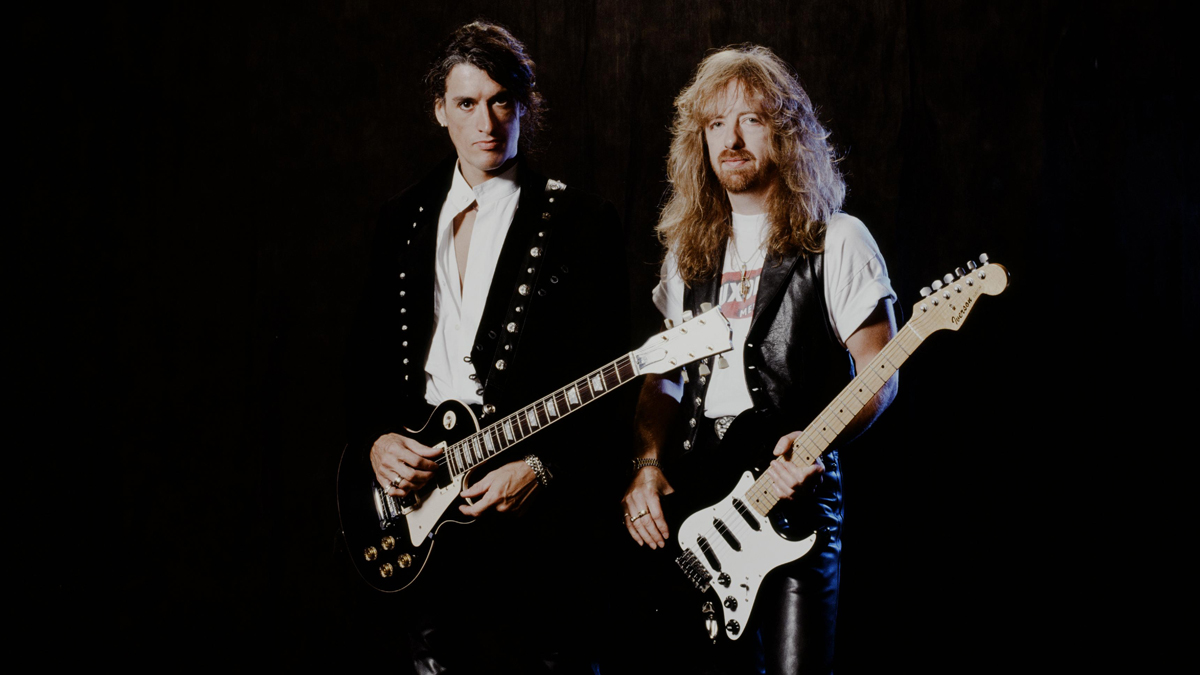
Aerosmith guitarist Joe Perry may confess to being (mostly) a “stone-cold Gibson man,” but the rock icon says the one guitar from his ‘70s heyday he wishes he still had is a Strat – specifically, the instrument he used to record Walk This Way.
Aerosmith’s career got off to a stuttering start, with their first two albums receiving a lukewarm reception. Then, with 1975’s Toys in the Attic, the band hit their stride – and a combination of Les Pauls and Strats – that proved magic.
“I always felt like we should sound like one of us was playing a Fender Stratocaster and the other was playing a Gibson Les Paul,” Perry says in the latest issue of Total Guitar. “We liked the idea of having two different guitar sounds.”
His Les Paul of choice was a ‘59 Burst, saying he “loved the thickness” of its neck, but it is a ‘50s Strat that Perry’s mind is drawn to now.
“I think a lot of people, when they think of us in those years, are us playing Les Pauls,” he continues.
“But I recorded a lot with Strats. I was definitely a stone-cold Gibson man, but I seemed to gravitate more toward Strats and that variety of tones. Plus you had the vibrato…I always felt like it was one more color on your paint palette.”
Perry has previously discussed the surprising prevalence of Strats in Aerosmith’s ’70s recordings.
Guitar World scribe, Chris Gill – deciphering the magic of Walk This Way's guitar tone – says Perry plugged two guitars into an Ampeg V-2, a 60-watt tube head.
His main rhythm track – panned to the left, with co-guitarist Brad Whitford heard on the right – saw him grabbing a double-cutaway Gibson Les Paul Junior with a P-90 pickup. While the same guitar was used for his first solo on the track, his beloved late-’50s Strat featured on the second.
“He begins the second solo on the Strat’s bridge pickup,” writes Gill “but starting at the outro’s fat, sustained note bends (around 2:45) he switches to the Strat’s neck pickup and engages a ’70s Maestro FZ-1S Fuzz-Tone to further thicken the midrange and make the guitar 'sound like an electric razor.'”
Four years later, Perry’s collection was slimmed down in light of his departure from the grandstand American rockers.
The guitarist stepped away from the band in 1979, mostly due to internal wrangles (though he has also previously discussed hearing Van Halen’s debut album and declaring “we’re not ready for the ‘80s.”)
Regardless of the reason, the decision saw him lose access to a number of the guitars he had owned or used, with the Strat ultimately becoming the one that got away.

“I really wasn’t into collecting guitars,” he reflects. “At that point, I had a few Les Pauls, a few Juniors or Strats, but that was it. Honestly, the guitar I miss the most from that era is the Strat I recorded Walk This Way with, which went the way of the wind when I left the band.”
The Strat never came back to Perry, but the Aerosmith man felt at the time that he needed to sever all ties with the band, including his gear.
“Right around then, I wanted to clear the decks and clear my head,” Perry tells Total Guitar. “I took most of my Aerosmith guitars, put them in road boxes, and left them there.”
To read the full interview with Perry, which charts the gear and conversations that dictated his entire Aerosmith career, pick up issue 385 of Total Guitar at Magazines Direct.







